BAKU, Azerbaijan, June 13. On the night of June 13, a series of explosions rocked several key regions in Iran - including the capital Tehran, Isfahan, and near the strategically important nuclear facility in Natanz, Trend reports.
These blasts were the result of a coordinated airstrike by the Israeli Air Force targeting sites linked to Iran’s nuclear program and missile production.
In response, Iranian air defenses were put on high alert, airspace over several regions was closed, and Imam Khomeini International Airport was temporarily shut down. Meanwhile, the International Atomic Energy Agency (IAEA) confirmed that facilities in Isfahan and Bushehr remained untouched, but the nuclear complex in Natanz was struck. Importantly, no increase in radiation levels was detected, suggesting the damage was limited.
For years, Iran has posed one of the gravest threats to Israel - not just ideologically but practically. The Iranian government openly and repeatedly calls for the destruction of the Jewish state, a stance that goes beyond rhetoric and is deeply embedded in its leadership’s policy.
Iran is widely regarded as the world’s leading state sponsor of terrorism and has invested heavily in building up its military capabilities, all aimed at realizing its goal of eliminating Israel. Particular focus has been placed on advancing its nuclear program and developing missile delivery systems capable of carrying nuclear warheads.
IAEA reports have consistently shown that Iran’s nuclear program is far from peaceful. The agency has documented multiple violations and clear signs of secret nuclear weapons development. Currently, Iran has amassed over 400 kilograms of uranium enriched up to 60% - just a technical step away from the 90% enrichment needed for a nuclear weapon. What’s especially alarming is the sharp increase in enriched uranium stockpiles over recent months.
Between April and May 2024, Iran and the United States held several indirect talks, brokered by Oman, aiming to curb Tehran’s nuclear ambitions. Yet, these diplomatic efforts appear to have been a cover for Iran’s accelerated nuclear development and malicious intent.
Israeli Prime Minister Benjamin Netanyahu described Israel’s actions as a necessary campaign of self-defense to neutralize an “unacceptable threat”. The operation is deliberate and focused, targeting military facilities linked to Iran’s nuclear and missile programs.
Israel stresses that its strikes are aimed not at Iranian civilians but at radical elements threatening its security. Efforts are being made to minimize civilian casualties.
Under international law, Israel exercises its right to self-defense in the face of an imminent and real threat from Iran.
Today, Iran stands just steps away from possessing a full nuclear arsenal - a red line for Israel and the international community. Given Tehran’s public calls for Israel’s destruction, as well as the ongoing expansion of its nuclear and military capabilities, the very existence of the Jewish state is at risk.
Israel’s military operation represents an attempt to halt this trajectory before Iran can turn its threats into reality.
The international community, including the IAEA, continues to call for Iranian transparency and cooperation, but experience shows the regime prefers deception and manipulation. Iranian Vice President Mohammad Eslami, who leads the country’s atomic energy agency, insists that Iran’s nuclear program is peaceful and rejects nuclear weapons - yet behind this rhetoric lies an intensive expansion of nuclear capabilities.
Israel’s nighttime airstrikes mark the climax of a long escalation in the Iranian threat. This is not just a struggle to prevent nuclear weapons development by a hostile regime, but a deep strategic clash of worldviews and national interests.
The key question now is how Iran will respond and whether this will escalate into a broader regional conflict. One thing is clear: Israel has demonstrated its readiness to act decisively and will not wait until the threat becomes irreversible.







